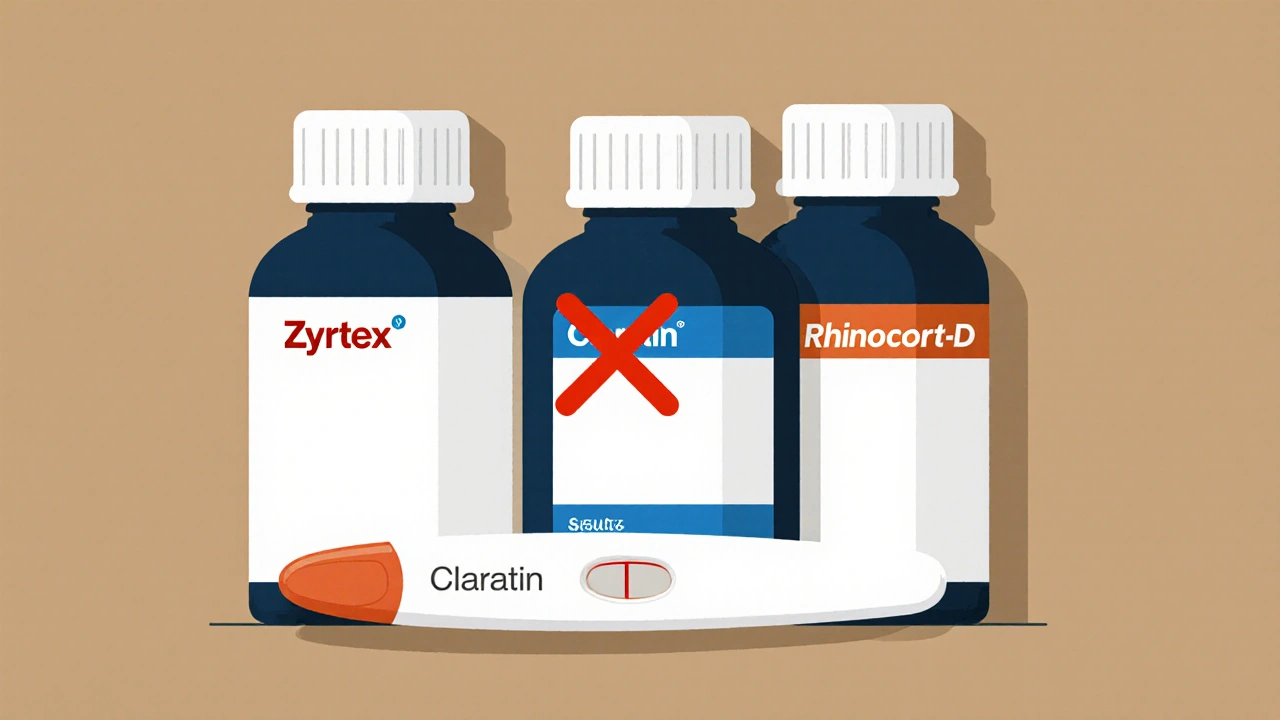Managing allergies during pregnancy isn’t just about sneezing and itchy eyes-it’s about making smart choices that protect both you and your baby. About one in three pregnant people deal with allergic rhinitis, hives, or conjunctivitis, and many need medication to breathe easier and sleep better. But not all allergy drugs are created equal when you’re pregnant. Some are safe. Others carry risks, especially in the first trimester. The good news? There are clear, evidence-backed options that work without harming your baby.
What’s Safe in the First Trimester?
The first 12 weeks of pregnancy are when your baby’s organs are forming. That’s why doctors urge caution with any medication during this time-even ones you’ve used for years. The safest approach? Start with non-drug methods. Use a saline nasal spray or rinse to clear out pollen and dust. Run a HEPA air filter in your bedroom. Keep windows closed during high pollen seasons. Wash your bedding weekly in hot water. These steps alone can cut symptoms significantly.If you still need something stronger, nasal corticosteroid sprays are your best bet. Rhinocort (budesonide) has the most safety data of any nasal steroid in pregnancy. It’s been studied in over 10,000 pregnancies with no increased risk of birth defects. Flonase Sensimist (fluticasone furoate) and Nasonex (mometasone) are also considered safe. But avoid Nasacort (triamcinolone)-it doesn’t have enough data to say it’s safe.
For oral relief, first-generation antihistamines like diphenhydramine (Benadryl) and chlorpheniramine (Chlor-Trimeton) have been used safely for decades. A 2010 meta-analysis of over 200,000 pregnancies found no link between these drugs and birth defects. The catch? They make you drowsy. If you need to drive or care for other kids, that’s a problem.
Second-Generation Antihistamines: Zyrtec, Claritin, Allegra
Second-generation antihistamines like cetirizine (Zyrtec), loratadine (Claritin), and fexofenadine (Allegra) are non-drowsy and popular. They’re generally considered safe after the first trimester. Studies show no increased risk of major birth defects with Zyrtec or Claritin. The FDA classifies fexofenadine as Category C-not because it’s dangerous, but because there’s less human data. Animal studies are reassuring, but doctors often recommend Zyrtec or Claritin first.Always check the label. Products like Claritin-D or Zyrtec-D contain pseudoephedrine, a decongestant. Those are a no-go in early pregnancy. Stick to the plain versions-no “-D,” no “Multi-Symptom,” no “Nighttime.”
Decongestants: The Red Flags
Pseudoephedrine (Sudafed) and phenylephrine are the most risky oral decongestants during pregnancy. A 2009 study found that using pseudoephedrine in the first trimester was linked to a 2.4 times higher risk of gastroschisis-a rare abdominal wall defect. That’s why most doctors avoid it entirely before week 12.After the first trimester, Mayo Clinic says low-dose pseudoephedrine (30-60 mg every 4-6 hours, max 240 mg per day) can be used cautiously if you have severe congestion and no high blood pressure. But even then, it’s a last resort. Phenylephrine has even less safety data and is not recommended.
Nasal decongestant sprays like Afrin (oxymetazoline) are okay for 3 days or less, but they’re not ideal. Overuse can cause rebound congestion, and there’s not enough data to prove long-term safety. If you need a spray, stick with saline or a nasal steroid instead.

What About Allergy Shots?
If you were already getting allergy shots (immunotherapy) before pregnancy, you can usually continue them. The American College of Allergy, Asthma, and Immunology says stopping them suddenly could cause worse symptoms, which is riskier than staying on them. But never start allergy shots while pregnant. Your immune system is already working overtime-adding new allergens could trigger a reaction.Asthma and Allergies: Don’t Ignore the Lungs
About 8% of pregnant people have asthma. Untreated asthma is far more dangerous to your baby than most asthma medications. Inhaled corticosteroids like fluticasone (Flovent), budesonide (Pulmicort), and mometasone (Asmanex) are safe throughout pregnancy. They target your lungs directly with minimal absorption into your bloodstream. Oral steroids like prednisone should only be used if absolutely necessary and for the shortest time possible.Don’t assume your asthma will improve during pregnancy. For some, it gets worse. For others, it stays the same. Work with your doctor to have a written asthma action plan before you get pregnant-or as soon as you find out you’re expecting.

Dosing and Formulations: What to Avoid
It’s not just the drug-it’s the form. Avoid extended-release (ER), sustained-release (SA), or combination products. A single tablet labeled “Claritin-D” or “Zyrtec-D” contains pseudoephedrine. Even “Nighttime Allergy” versions often include diphenhydramine plus decongestants. Stick to plain, single-ingredient tablets.Standard doses are:
- Cetirizine (Zyrtec): 10 mg once daily
- Loratadine (Claritin): 10 mg once daily
- Diphenhydramine (Benadryl): 25-50 mg every 4-6 hours as needed
- Budesonide nasal spray (Rhinocort): 1-2 sprays per nostril once daily
Always start with the lowest effective dose. If one tablet helps, don’t take two. Your body is more sensitive during pregnancy.
The Bigger Picture: Safety Data and New Research
The FDA stopped using the old A, B, C, D, X categories in 2018. Now, labels give detailed summaries of risks, benefits, and data. But many doctors and websites still reference the old system, so you might see “Category B” or “Category C.” Don’t panic. “C” doesn’t mean “dangerous”-it means “we don’t have enough human studies.” That’s why Zyrtec and Claritin are still first-line choices: they have real-world data from hundreds of thousands of pregnancies.The NIH is running a Pregnancy Exposure Registry with over 15,000 participants since 2018. Early results, expected in late 2024, will help update guidelines in 2025. That means today’s recommendations are already based on the best evidence we have-and they’ll only get better.
When to Call Your Doctor
You don’t need to suffer through allergy season alone. But you also shouldn’t guess what’s safe. Call your OB or allergist if:- Your symptoms are worse than usual
- You’re using OTC meds more than 2-3 days a week
- You’re considering a new medication
- You have asthma or high blood pressure
Your provider can help you pick the right drug, the right dose, and the right time. There’s no one-size-fits-all answer-but there are safe, effective options. You don’t have to choose between breathing well and protecting your baby. You can do both.
Is Zyrtec safe during pregnancy?
Yes, cetirizine (Zyrtec) is considered safe during pregnancy, especially after the first trimester. Studies involving over 100,000 pregnancies show no increased risk of birth defects. It’s a non-drowsy antihistamine and is often preferred over Benadryl because it doesn’t cause sedation. The standard dose is 10 mg once daily.
Can I take Benadryl while pregnant?
Yes, diphenhydramine (Benadryl) has been used safely for decades during pregnancy. Large studies found no link to birth defects. But it causes drowsiness, so it’s best for nighttime use or when you don’t need to be alert. Avoid long-term daily use unless directed by your doctor.
Is Claritin-D safe during pregnancy?
No, Claritin-D is not safe during pregnancy because it contains pseudoephedrine, a decongestant linked to a higher risk of birth defects in the first trimester. Only use plain Claritin (loratadine) without the “-D.” Always check the active ingredients list.
What nasal spray is safest during pregnancy?
Rhinocort (budesonide) is the most studied and recommended nasal steroid during pregnancy. Flonase Sensimist (fluticasone furoate) and Nasonex (mometasone) are also safe. Avoid Nasacort (triamcinolone) due to limited safety data. Saline sprays are always safe and can be used as often as needed.
Can I use Afrin nasal spray while pregnant?
Afrin (oxymetazoline) can be used for up to 3 days in a row if you have severe congestion, but it’s not recommended as a regular treatment. There’s not enough data to prove long-term safety, and overuse can cause rebound congestion. Nasal steroids or saline rinses are better long-term options.
Should I stop my allergy shots if I get pregnant?
No, if you were already receiving allergy shots before pregnancy, you can usually continue them at the same dose. Stopping suddenly may worsen your symptoms, which could be riskier than continuing. But never start allergy shots while pregnant-new treatments should wait until after delivery.
Are asthma inhalers safe during pregnancy?
Yes, inhaled corticosteroids like Flovent, Pulmicort, and Asmanex are safe and recommended during pregnancy. Uncontrolled asthma poses a greater risk to your baby than the medication. Always use your inhaler as prescribed. Oral steroids should be avoided unless absolutely necessary.
What if I took Sudafed before I knew I was pregnant?
If you took pseudoephedrine (Sudafed) before you knew you were pregnant, especially in the first trimester, don’t panic. The increased risk of gastroschisis is rare and tied to regular or high-dose use. One or two doses are unlikely to cause harm. Talk to your doctor, but there’s no need for routine testing unless you had prolonged exposure.


Written by Felix Greendale
View all posts by: Felix Greendale